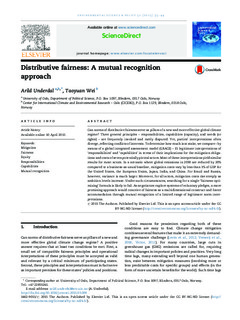Distributive fairness: A mutual recognition approach
Journal article, Peer reviewed
Published version
Permanent lenke
http://hdl.handle.net/11250/2466155Utgivelsesdato
2015Metadata
Vis full innførselSamlinger
- Journal articles [478]
Sammendrag
Can norms of distributive fairness serve as pillars of a new and more effective global climate regime? Three general principles – responsibilities, capabilities (capacity), and needs (or rights) – are frequently invoked and rarely disputed. Yet, parties’ interpretations often diverge, reflecting conflicts of interests. To determine how much is at stake, we compare – by means of a global integrated assessment model (GRACE) – 15 legitimate interpretations of ‘responsibilities’ and ‘capabilities’ in terms of their implications for the mitigation obligations and costs of seven potentially pivotal actors. Most of these interpretations yield similar results for most actors. In a scenario where global emissions in 2030 are reduced by 20% compared to a business-as-usual baseline, mitigation costs vary by less than 1% of GDP for the United States, the European Union, Japan, India, and China. For Brazil and Russia, however, variance is much larger. Moreover, for all actors, mitigation costs rise steeply as ambition levels increase. Under such circumstances, searching for a single ‘fairness-optimizing’ formula is likely to fail. As negotiators explore systems of voluntary pledges, a more promising approach would conceive of fairness as a multidimensional construct and foster accommodation through mutual recognition of a limited range of legitimate norm interpretations.

